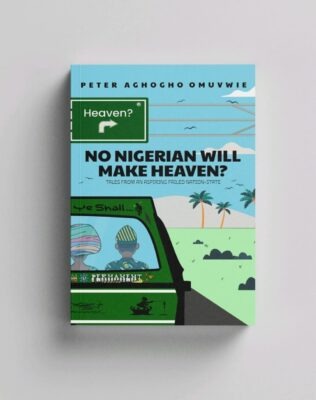Book Reviews
Review of No Nigerian Will Make Heaven?
I picked up this book after a picture of it went viral on X. I was intrigued by a book titled *No Nigerian Will Make Heaven*. I mean, what could you possibly have to say to justify a title like that?
I’ll try to break down what this book is about, but I should warn you—it’s very political and will force you to reevaluate how you process and engage with politics in Nigeria, especially recently.
The book starts off with Peter saying Nigeria might be cursed. This is a sentiment most of us share because, honestly, are we not cursed? We are a rich country of 356 ethnic groups, blessed with fertile land, oil, and millions of hardworking youth, but we still don’t work as a country. Why is that?
Before I tell you why, I want you to understand *the power of a name*, or more importantly, how Peter describes it.
It’s very easy to talk about how Nigeria got its name from Flora Shaw. I was taught about it in primary school. But what about the weight of it? What could be the implication of a white woman looking at a vast, prosperous slave-trading empire and deciding to name it Nigeria?

Let’s step back a little. It’s no secret to us Africans that names hold a different meaning here. Sometimes, it’s believed that names can influence a person’s destiny. In some cultures, firstborn children don’t answer certain names because we believe that what you are called impacts what you become. With this book, Peter is saying that the very naming of Nigeria by a colonial figure is a tie to colonialism, and that tie or bond still has a lasting impact on Nigeria’s identity and self-determination. Peter also talks about his own name and how he had to adapt “Peter” for convenience.
By establishing the name of Nigeria, Peter now comes to describe it as a country of contradictions. We are rich by all measures but still poor, still dying, still suffering. Person wey dey near river no dey bath with spit. Except that’s our reality. And why is that? What is this absurdity of lack in the midst of plenty? What is this ridiculous and obscene wealth existing side by side with life-threatening poverty?
This is where Peter says maybe Nigeria is cursed 🤣—because what other explanation is there? But we’ll get to that.
Peter dives deep into the trans-Saharan and trans-Atlantic slave trades—a thousand years of slavery. He examines how the history of extraction from Africa has left a gaping wound. How Africa is the keeper of the vineyard (Europe) but has not kept its own vineyard (Africa). We are essentially a continent that has known only extraction. So now, even without the obvious forces of the West, we still somehow manage to export ourselves and our resources to them, with little care for our home. We were never taught how to nurture our vineyard, how to make laws that protect our interests. We were just taught how to serve.

It was particularly difficult reading this part because of the pain, but it was necessary for Peter to go as far back as possible in order to move forward.
One audacious thing about Peter’s analysis of Nigeria’s past before moving to its present is the 1914 amalgamation. He argues that the amalgamation was not a result of unity or some ridiculous notion that the Southern and Northern Protectorates belonged together. Rather, it was for profit. Britain just wanted more profit, and what better way to get it than by merging these vast portions of land and drafting better strategies for exploiting it instead of dealing with the logistics of exploiting two territories? But, of course, they had to find a way to make the amalgamation look like a noble cause.
In this part of the book, Peter examines how colonial powers exploited existing divisions for their own gain. And when they saw the South would be more useful propping up the North with its resources, they thought, Hell yeah! None of these decisions have been about Nigeria’s welfare. Everything has been about catering to the European vineyard.
Please stay with me as we now approach present-day Nigeria and how we are still suffering from the choices of our colonial masters—only this time, our leaders have found a way to make it ten times worse by learning a few tricks from our colonial past.
Post-colonialism, Nigeria started—and is still struggling—with what Peter calls ethnic-race. He argues that Nigeria’s move to democracy was more symbolic than realistic and that the real power in Nigeria has never really changed hands. This sets the stage for our internal ethnic conflicts.
But no one can talk about Nigeria’s history without talking about the Nigerian-Biafran War. Peter asks: why has a country that has tasted civil war—barely survived it—still been at so much war with itself?
This is where his concept of the Centralized Nucleus Group comes to life. Peter describes this group as a small but powerful elite force in Nigeria that emerged from the chaos of post-colonial Nigeria. He calls them a parasitic force united in their pursuit of self-enrichment, exploiting the division of the masses. The key points here are *division* and *exploitation*. Remember when I described this as something colonial powers were masters at? Essentially, this nucleus group has inherited a system of exploitation, mastered it, and will stop at nothing to achieve their twisted definitions of self-enrichment.
This leads to the core theory of the book: Acute Social Fission (ASF).
Think of ASF as a process of fragmentation that weakens the 356 ethnic groups in Nigeria. Basically, the theory argues that the constant division and fragmentation of Nigerians actively prevents unity, which in turn prevents any form of progress for the average Nigerian. Like in the Bible: A house divided against itself cannot stand.
The core of ASF is that the nucleus group exploits the ethnic and religious differences among Nigerians, further encouraging those divisions as a way of keeping the masses fighting amongst themselves while they remain united. So they are united in power and ideology, while the masses are divided in varying degrees. A real life example of the ASF would be the last presidential election. A lot of votes were lost to the masses fighting amongst themselves. Who was Yoruba, who was Igbo? Who belonged to Lagos? and who owns Lagos? And because the fragmentation runs deep, unity is almost impossible.
Or is it possible?
Furthermore in the book, Peter proposes multiple actionable solutions and ways forward. His solutions acknowledge how complicated the issues are and I appreciate him for it. It’s not enough to discuss our issues in the country, we must look at the way forward too.
I’m going to stop my crazy analysis of the book here. It’s a rabbit hole kind of book. If you don’t stop yourself, you’ll keep going further down. The ASF theory is very interesting, and it almost overwhelmed me. I should also mention that I am someone who is used to fiction, I’m accustomed to a certain level of language and accessibility. Although this book is pretty much accessible, there was that slight change in how I consumed it. It forced me to sit with it at odd times like on the bus, when I’m walking etc, I found myself identifying patterns in people’s behaviours and how we deal with problems as a society.
Overall, this is a very important book. It’s heavy, funny at times, and very serious.
There are so many aspects I haven’t discussed, and this is very intentional. I’ve left some surprises in the book for you, the reader, to discover and ponder upon. For me, I’ve highlighted some of the ones I’ve been pondering about. I’ve also left everything about the solution to our problem as Nigerians in the book for you to experience.
About The Writer: Nnaemeka Nnam is a Nigerian writer and bookstagrammer. He has been published or forthcoming at Nnọkọ Stories, W&S UK, and Isele Magazine. He is an alum of Sprin NG Writer’s Fellowship 2023 and Idembeka Creative Writing Workshop 2023. Nnaemeka wants you to embrace love, sadness and joy as they come. When he’s not obsessing over books on Instagram, he is wishing upon a star.


